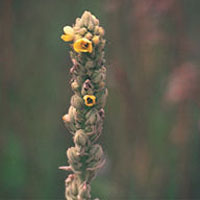Mullein
 © Eric Yarnell
© Eric YarnellHow It Works
Mullein contains approximately 3% mucilage and small amounts of saponins and tannins.3 The mucilaginous constituents are thought to be responsible for the soothing actions on mucous membranes. The saponins may be responsible for the expectorant actions of mullein.4 Human clinical trials are lacking to confirm the use of mullien for any condition, however.
How to Use It
A tea of mullein is made by pouring 1 cup (250 ml) of boiling water over 1–2 teaspoons (5–10 grams) of dried leaves or flowers and steeping for ten to fifteen minutes. The tea can be drunk three to four times per day. For the tincture, 1/4–3/4 teaspoon (1–4 ml) is taken three to four times per day. As a dried product, 1/2–3/4 teaspoon (3–4 grams) is used three times per day.5 Mullein is sometimes combined with other demulcent or expectorant herbs when used to treat coughs and bronchial irritation. For ear infections, some doctors apply an oil extract directly in the ear. If the eardrum has ruptured, nothing should be put directly in the ear. Therefore, a qualified healthcare professional should always do an ear examination before mullein oil is placed in the ear.
Copyright © 2026 TraceGains, Inc. All rights reserved.
Learn more about TraceGains, the company.
The information presented by TraceGains is for informational purposes only. It is based on scientific studies (human, animal, or in vitro), clinical experience, or traditional usage as cited in each article. The results reported may not necessarily occur in all individuals. Self-treatment is not recommended for life-threatening conditions that require medical treatment under a doctor's care. For many of the conditions discussed, treatment with prescription or over the counter medication is also available. Consult your doctor, practitioner, and/or pharmacist for any health problem and before using any supplements or before making any changes in prescribed medications. Information expires December 2026.
